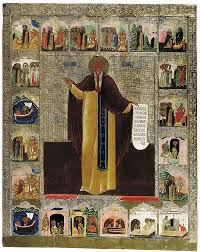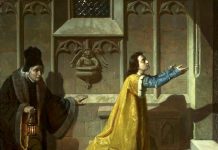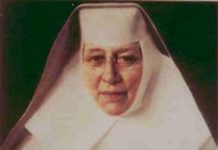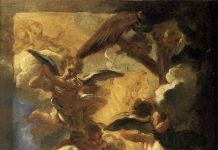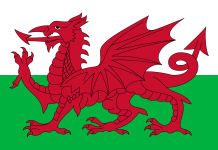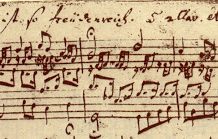Today is Saint Martin’s Day, (+397), a former soldier in the Roman empire who, inspired by the edifying example of the Christians, decided as a ten year old to convert to Catholicism (people grew up earlier back then). His pagan father objected, and Martin served as a Catholic in the mostly pagan Roman army, completing his entire military service, and was not released until he was in his mid-forties. It was the accession of Julian the Apostate in 361, a rabid anti-Catholic emperor, which made up Martin’s mind, prompting him in the midst of a battle to give his life completely to Christ. Laying down his sword, refusing to fight any further, he was charged with cowardice. Au contraire, Martin retorted, offering to go to the front unarmed, from which he was saved by the enemy suing for peace.
Martin became a monk, a hermit really, but, as is oft the case with holy men, he was sought out, and acclaimed bishop of Tours in 371, instantly beloved of the people. He fulfilled the task tirelessly, devoting his military discipline and energy to serving the poor, prisoners, sinners, giving his life for all his flock, setting the foundation of the youthful Church in France, until his death in 397.
The story of his cloak, half of which he gave to a shivering beggar, and in whose form Christ later appeared to the saint in a vision, has passed into hagiographical lore: The relic of the cloak was held in such veneration that the oratory where it was kept was called a ‘capella‘, Latin for ‘cloak’, from which we now derive our English term ‘chapel’ and ‘chaplain’. Saint Martin was the first non-martyr to be officially canonized, and in the near-contemporary biography by fellow monk and bishop, and one of the first Church historians, Sulpicius Severus (363-425), Martin’s noble and pure soul shines through the ages:
Here was a man words cannot describe. Death could not defeat him nor toil dismay him. He was quite without a preference of his own; he neither feared to die nor refused to live. With eyes and hands always raised to heaven he never withdrew his unconquered spirit from prayer. It happened that some priests who had gathered at his bedside suggested that he should give his poor body some relief by lying on his other side. He answered: “Allow me, brothers, to look towards heaven rather than at the earth, so that my spirit may set on the right course when the time comes for me to go on my journey to the Lord.” As he spoke these words, he saw the devil standing near. “Why do you stand there, you bloodthirsty brute?” he cried. “Murderer, you will not have me for your prey. Abraham is welcoming me into his embrace.”
With these words, he gave up his spirit to heaven. Filled with joy, Martin was welcomed by Abraham. Thus he left this life a poor and lowly man and entered heaven rich in God’s favour.
Martin is the patron saint of winemakers, based on the legend that his donkey feasted on some grapes while Martin was engaged in sacramental ministry, and the wines made from that vine was dramatically improved. In some places, still Catholic in their culture, new wine is blessed on this day.
And speaking of new wine, it’s Remembrance Day here in Canada as well as Britain and the rest of her dominions and territories; in America, it’s Veterans’ Day. Both commemorate the signing of the armistice ending the war to end all wars on the eleventh hour, on the eleventh day of the eleventh month.
If it is dulce et decorum pro patribus mori – ‘sweet and fitting to die for one’s country’ (or ancestors) – we in turn owe it to remember and pray for those who went before who made that ultimate sacrifice, especially in the horrors of both World Wars. Millions of young men on the battlefield, along with untold numbers of civilians, women, children, as the war to end all wars spread beyond the trenches, into the sanctuary of homes and churches. Nothing and no one was spared. Even those apparently unscathed were at the very least willing to face the worst, as they stormed over hills, onto fortified beaches in the face of machine guns and artillery; fierce guerilla warfare from house to house; infernal battlegrounds the world over.
There are distinctions to be made here, however: We do not rejoice in war itself, nor even in the oft-limited victories won. Many, perhaps all, of the more recent wars and conflicts in history have not fully fulfilled the criteria of what the Church calls a ‘just war’, and most end in some sort of uneasy and unjust compromise – as the last World War did with Stalin’s Communism taking over half of Europe and much of Asia – which has set the stage for further conflict. In this life, we will have no lasting peace.
Yet, we honour the sacrifice of those who were willing to serve and die still stands.
They died for the rights and freedoms we now enjoy, those same freedoms are now being whittled away – one might say given away – with each passing law under a Prime Minister unfit for office, whose moral principles and zeal for all the wrong causes deface our history and undermine our institutions, including our military. The best that can be said of Trudeau fils is that he knows not what he does. There is still much in Canada to rejoice in, but the very bedrock of our nation is being dismantled: The right to life of the unborn is non-existent, and now this same right and God-give protection is being taken from the sick, elderly and the psychologically vulnerable, as euthanasia ravages the land. Political correctness, radical environmentalism, medical tyranny, destruction of the economy, obeisance to the increasingly strident claims of various victim groups, rule our schools, our media, our courts against the principles of reason and right order. And what’s left of our reason is itself being compromised by legalized marijuana, all the more easy, perhaps, to dominate a dominion of the dope-addled.
All of this would have saddened our soldiers of yore, had they been given a glimpse of the future as they fought and died. As the poet warns, if he break faith with us who die. Most of the young generation now supports outright socialism, the very spirit which embodied both evil regimes – Nazism and Communism – we fought in the last World War. What irony, and tragedy, that we are now instantiating those very evils! What really are ‘Canadian values’, for what did they fight and die, and, most to the point, for what are we now fighting?
Let it not be said they died in vain, but may their sacrifice bear the fruit it deserves.
In all of this, we should be aware that our primary battle is not against external enemies, but rather interior and spiritual, against the ‘principalities and powers’ that seek the destruction of souls. For if the soul of a nation is dead, what will inspire us to defend its body and its geographical borders? What, we may ask, still unites us now as Canadians?
I know not whether those who chose the eleventh month and the eleventh hour as the moment to end the ‘war to end all wars’ knew they were choosing also this memorial of the patron saint of soldiers, one of the most venerated of her panoply, but such are the ways of providence, and the God Who takes, shall we say, the long view of things.
As we recall the sacrifice of our forefathers in war, we should also recall this forefather in our spiritual struggles, and all who followed in his footsteps, without which all other exterior battles lose their meaning. To paraphrase Saint Paul, if our focus is on this world alone, we are of all men most to be pitied.
But if we fight for our eternal homeland, and all that is necessary to attain such, our religious freedoms, home, hearth and family, well then, the battle is the Lord’s. And He is not a God of weakness, but of strength, His victory assured.
Saint Martin of Tours, ora pro eis, et pro nobis.

